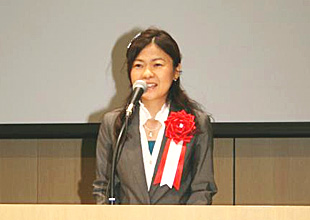 The Winner of the Ninth Asia Pacific Research Prize (Iue Prize) : Dr. Junko Yano
The Winner of the Ninth Asia Pacific Research Prize (Iue Prize) : Dr. Junko Yano
Title of Dissertation : National Formation and Language Nationalism in Laos: Form the Colonial Period to the Socialist Revolution (1893-1975)

- Dr. Junko Yano
-
- Career -
Junko YANO, Postdoctoral Researcher at Hitotsubashi University, is a specialist in Modern Lao History and Sociology of Language. After graduating from Department of Cultural History of Doshisha University with a B.A. in history in 1998, acquired the M.A. and Ph.D. degrees in 2001 and 2009, respectively, at the Graduate School of Language and Society, Hitotsubashi University (the Graduate School). During enrollment at the Graduate School, visited Laos twice to study at the Faculty of Letters, National University of Laos;―namely, during 1999 through 2000, and 2002 through 2004. Also served as Research Fellow (DC2) for the Japan Society for the Promotion of Science during 2005 through 2007; has been Part-time Lecturer at Tokyo University of Foreign Studies since 2004, while acting as an External Researcher in the Research Project (for Laos) by Institute of Developing Economies, Japan External Trade Organization (a.k.a. JETRO).
- Summary -
- National Formation and Language Nationalism in Laos:
From the Colonial Period to the Socialist Revolution (1893-1975) -
The purpose of this paper is to clarify the process of the Lao language standardization and its impact on the Lao national formation since the French colonial period.
Laos is a landlocked country on the Indochina Peninsula, which shares common borders with China, Burma, Vietnam Cambodia, and Thailand. There are 49 ethnic groups in the country and the largest one is the ethnic Lao, which occupies around half of the total population (5.8 million in 2006).
The present territory of Laos was formed as a result of the border negotiations made between French and Siam. Before the French colonization, there were 3 ethnic Lao Kingdoms in this area, provided, however, that, all three of them being under the Siamese rule. Because of this historical background, Siam never abandoned the claim for the recovery of its lost territory after the border demarcation. The language similarity between Lao and Thai formed the basis for this Siamese claim.
In contravention of this Siamese claim, with the intent to establish the linguistic independence of the Lao language as distinct from Thai and as a protector of Laos against the Siamese threat, French attempted to justify her colonial rule through a positive measure for restoration of the Lao language which had experienced a severe degeneration during the Siamese rule.
Therefore, it seems reasonable to hypothecate that this was the beginning of the substantiation process, under the French rule, for standardization of the Lao language based upon the "negative identification", or formation of the national language through drawing a clear distinction between the two languages.
In this paper, I consider the development of the language nationalism in Laos under the three different regimes: French Colonial rule, Royal Lao Government and Pathet Lao, in view of the language ideology, controversy on the orthography, vocabulary, etc. The conclusion drawn in this paper is summarized as follows: As the main body of the language standardization shifted from the colonial ruler to the ruled, the two languages of old and new rulers, namely, Thai then French, worked as the catalyst of the "negative identification" which paradoxically awakened the Lao people's awareness of the Lao language as their national language, - and so did their consciousness as the Lao nation - through the actions taken for establishing the independence of their language from those of the two rulers.






